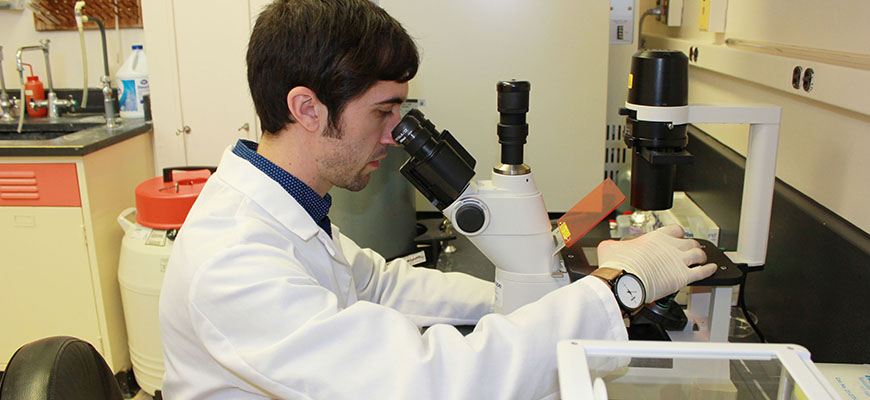
A dual purpose
Physician-scientists needed to help bridge gap between biomedical discoveries, patient care
Posted on: March 26, 2018; Updated on: March 26, 2018
By Megan Sexton, MSEXTON@mailbox.sc.edu, 803-777-1421
Johnie Hodge knows he wants a career focused on medical research. He also knows the importance of having access to patients.
The solution – dual degrees from the University of South Carolina School of Medicine.
Hodge finished the first two years of medical school before moving over to the doctoral program in biomedical sciences. He now is in the third and final year of the Ph.D. program, and plans to start his final two years of medical school this summer.
“I really want to do medical research, but I want it to be clinically oriented, basic science research,” Hodge says. “I feel like to really know how to do basic science research, a Ph.D. is a good way to be trained to do that. And you need the M.D. to deal with people and to help get that clinically focused aspect.”
Hodge earned his undergraduate and master’s degree in bioengineering with an electrical concentration from Clemson in 2013 before coming home to Carolina. A native of Elgin, he attended Cardinal Newman High School in Columbia.
As the pressure for generating clinical revenue continues to increase, with decreases in reimbursements for clinical activity, the need to bridge the chasm between clinical care and biomedical discoveries will become more acutely needed.
Dr. Francis Spinale, associate dean for research and graduate education, USC School of Medicine
He expects to earn his Ph.D. in May, with his goal to have two first-author papers submitted by then. His doctoral research looks at innate immune therapies for breast cancer. His first project involves the testing of a Chinese herb-derived compound called emodin as an adjuvant therapy to prevent breast cancer metastatic recurrence after surgical resection of the primary tumor. The goal of the second project is to increase the effectiveness of dendritic cell vaccine therapy through increased expression of microRNA 155 in the dendritic cells.
Hodge, along with two other Carolina graduate students, also is working with Angela Murphy in the medical school and Susan Steck from the Arnold School of Public Health. The two associate professors received a $405,000 grant from the Susan G. Komen Foundation to study disparities in breast cancer outcomes.
Hodge says he’s not sure what type of medicine he wants to pursue, saying most students don’t make that decision until their third year of medical school, but he is sure he wants to concentrate on research.
“From what I’ve seen, I feel like doing research and contributing to science in that incremental way is what I’ve always wanted to do,” he says. “A lot of people, when they see patients, they want to try distill everything to a set algorithm. When you are in the lab, you are trying to figure out what that algorithm is. I really like that challenge.”
The dual degree physician-scientist has the skills necessary to provide “a communication corridor between clinicians and scientists,” says Dr. Francis Spinale, the associate dean for research and graduate education at the USC School of Medicine. Spinale holds an M.D. and a Ph.D.
“The current NIH statistics have identified a steady increase in Ph.D. scientists obtaining biomedical sciences funding, but a continued decline in physician-scientists, particularly those with a dual degree applying for research funding,” Spinale says.
“As the pressure for generating clinical revenue continues to increase, with decreases in reimbursements for clinical activity, the need to bridge the chasm between clinical care and biomedical discoveries will become more acutely needed. Those individuals that obtain the dual degree and, as such, both clinical and formal biomedical science training, will become an ever more valuable piece to the puzzle in translating our biomedical discoveries to changes in medical practice.”
Share this Story! Let friends in your social network know what you are reading about